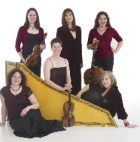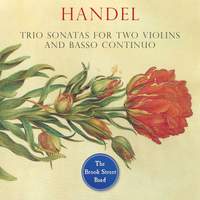Interview,
Brook Street Band at 20
 It feels like they've been an integral part of the UK's early music fabric for such a long time that I did a slight double-take recently when I realised that The Brook Street Band are celebrating their twentieth birthday this year; founded by the baroque cellist Tatty Theo (granddaughter of the great cellist William Pleeth), the group specialise in eighteenth-century repertoire (taking their name from Handel's most famous London address) and have a slew of well-received recordings to their name, including a glorious Water Music from 2008 and an intriguing disc of transcriptions of the recorder sonatas for cello (trust me, it works). Though the Band often augment their numbers for larger-scale projects, their core consists of two violinists, a cellist and a harpsichordist, so it's fitting that they've chosen to celebrate this significant birthday with a recording (out tomorrow on Avie) which explores Handel's trio sonatas.
It feels like they've been an integral part of the UK's early music fabric for such a long time that I did a slight double-take recently when I realised that The Brook Street Band are celebrating their twentieth birthday this year; founded by the baroque cellist Tatty Theo (granddaughter of the great cellist William Pleeth), the group specialise in eighteenth-century repertoire (taking their name from Handel's most famous London address) and have a slew of well-received recordings to their name, including a glorious Water Music from 2008 and an intriguing disc of transcriptions of the recorder sonatas for cello (trust me, it works). Though the Band often augment their numbers for larger-scale projects, their core consists of two violinists, a cellist and a harpsichordist, so it's fitting that they've chosen to celebrate this significant birthday with a recording (out tomorrow on Avie) which explores Handel's trio sonatas.
I spoke to Tatty earlier this week about this latest recording project and about their birthday plans in general…
So what made you light on these two sets of trio sonatas for your twentieth anniversary recording? Are they works which have played a significant role in the ensemble's history, or did they appeal because they can be seen as book-ending Handel's career?
A few of the works on the disc such as the trio sonata ‘Saul’, the Sinfonia, and the trio sonata HWV386a (which we often play as 386b in b minor with flute) have played a regular part in the BSB’s past repertoire, as well as the G minor trio sonata that was also familiar to me as a Victorian arrangement for 2 cellos. But there was something undeniably attractive about exploring lesser-known repertoire. All of Handel’s trio sonatas in Opus 2 and 5, have a fairly wide compositional time-span, even though they were published in grouped sets close together, so these don’t particularly buck that trend. But we definitely saw this recording as finishing off something we started a while back, presenting the complete Handel trio sonatas for 2 violins and basso continuo.
HWV 392-394 are known as the 'Dresden Sonatas' - how illuminating is this as a sobriquet, and how much do you think was Handel influenced by the music and musicians he'd encountered during his time in Dresden?
I’m not sure that a listener could discern a difference between these Dresden Sonatas, and others by Handel (composed in a different geographical location). The style, form and number of movements in each sonata is fairly typical, all adhering to the ‘da chiesa’ church pattern that Handel popularised with his better-known Opus 2 set.
What is important, however, is that Handel’s time in Dresden had a huge impact on his musical life afterwards in London. The addition of singers such as Senesino and Durastanti, hired by Handel whilst in Dresden for the Royal Academy hugely enhanced London’s musical scene, and Handel was undeniably influenced by the fantastic Italian opera scene in Dresden. Handel also encountered fabulous musicians such as the violinist Pisendal and flautist Quantz, men who could very well have influenced Handel’s writing for these instruments post Dresden.
The booklet-notes point out that ' this 'set' of pieces [was] grouped together posthumously rather than in Handel's lifetime' - how coherent (and/or cosmopolitan!) a group do they make?
They make a good group, no less coherent for the fact that they were grouped together posthumously. Handel’s other groups of trio sonatas were only really grouped together or reworked into groups by his publisher, also dating from different times. So this set is no different. It does make for a cosmopolitan group with Handel’s musical development (at least from the early Sinfonia to the late Saul) clearly audible. An early exuberant and youthful Italian style eventually gives way to controlled maturity in London roughly 30 years later. There’s a good contrast in keys too, creating different moods and colours.
There's a strong emphasis on 'Handel the Recycler' on this disc, with a lot of the musical material from these works resurfacing in Handel's operas and oratorios - what aspects of this music do you think made it so eminently suitable for vocal recycling?
The music re-appears in instrumental parts of oratorios e.g. Saul, rather than as a vocal line, although there are a few cases of Handel taking a vocal line from an earlier piece such as Agrippina and then recycling it into one of these trio sonatas. At the end of the day, a good tune is a good tune, and Handel obviously didn’t feel restricted by having his musical material interpreted through either a voice or a lyrical musical instrument, such as a violin.
The pedigree of HWV 393 and 394 has been called into question by some Handel scholars - how strongly do you feel them to be authentic Handel?
It’s hard to be totally objective about these two pieces, having studied them so intensely. I personally don’t think there can be any question about the authenticity of these two pieces. Both are strongly Handelian in feel, and HWV 393 (G minor) uses one of Handel’s preferred keys. In terms of its harmony, phrase shapes and the writing for each instrument, these pieces have all the Handelian hallmarks. Friedrich Chrysander (who compiled the first complete Handel edition for the Händel-Gesellschaft between 1858-1902) had no doubts, including these two pieces in the chamber music volume published in 1879, even though he added them into Opus 2.
Finally, what else do you have planned for your twentieth birthday celebrations?
Well, celebrations will naturally involve lots of cake, with various concerts and rehearsals up and down the country expanding the possibilities for trying new cake-shops! We have appearances at favourite places for the Band such as Dartington International Summer School, as well as new places for us such as Wells Cathedral, London’s Conway Hall and Cambridge Early Music. The main focus this summer is the Band’s Wigmore Hall concert on 17th July, presenting some of the Band’s favourite repertoire, with an expanded Band, adding old and new friends to our core group of 2 violins and continuo. Next year we round off the 20th Anniversary with a Handelian celebration, involving music, dance, lectures, food and friends, taking place in East Anglia in April 2017. Watch this space…
The Brook Street Band's new disc of Handel Trio Sonatas is released tomorrow on Avie.
Available Formats: CD, MP3, FLAC, Hi-Res FLAC



